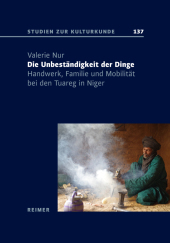
Die Unbeständigkeit der Dinge
Handwerk, Familie und Mobilität bei den Tuareg in Niger
Series: Studien zur Kulturkunde; 137;
- Publisher's listprice EUR 49.00
-
20 322 Ft (19 355 Ft + 5% VAT)
The price is estimated because at the time of ordering we do not know what conversion rates will apply to HUF / product currency when the book arrives. In case HUF is weaker, the price increases slightly, in case HUF is stronger, the price goes lower slightly.
- Discount 5% (cc. 1 016 Ft off)
- Discounted price 19 307 Ft (18 387 Ft + 5% VAT)
Subcribe now and take benefit of a favourable price.
Subscribe
20 322 Ft

Availability
Not yet published.
Why don't you give exact delivery time?
Delivery time is estimated on our previous experiences. We give estimations only, because we order from outside Hungary, and the delivery time mainly depends on how quickly the publisher supplies the book. Faster or slower deliveries both happen, but we do our best to supply as quickly as possible.
Product details:
- Publisher Reimer
- Date of Publication 9 September 2024
- Number of Volumes Broschur
- ISBN 9783496016984
- Binding Paperback
- No. of pages296 pages
- Size 20x170x240 mm
- Weight 755 g
- Language German
- Illustrations mit 61 Farbbildern 594
Categories
Long description:
Craft practices such as making a camel saddle, sewing a leather bag and forging axes and silver jewellery are tactile and material and require a trained eye as well as a certain understanding of the world of things.Based on one and a half years of mobile field research, Valerie Nur deals with Tuareg craftswomen and craftsmen and their knowledge and skills. Individual workshops are examined, as well as the ways in which the craftsmen and women pass on, exchange and continuously change their practices.
More



